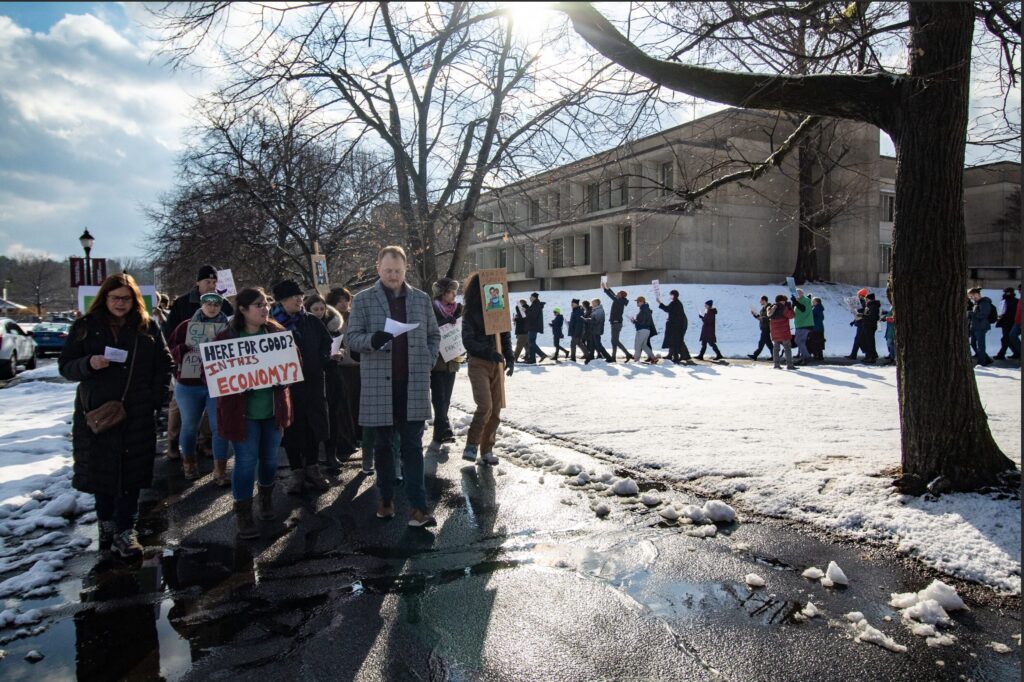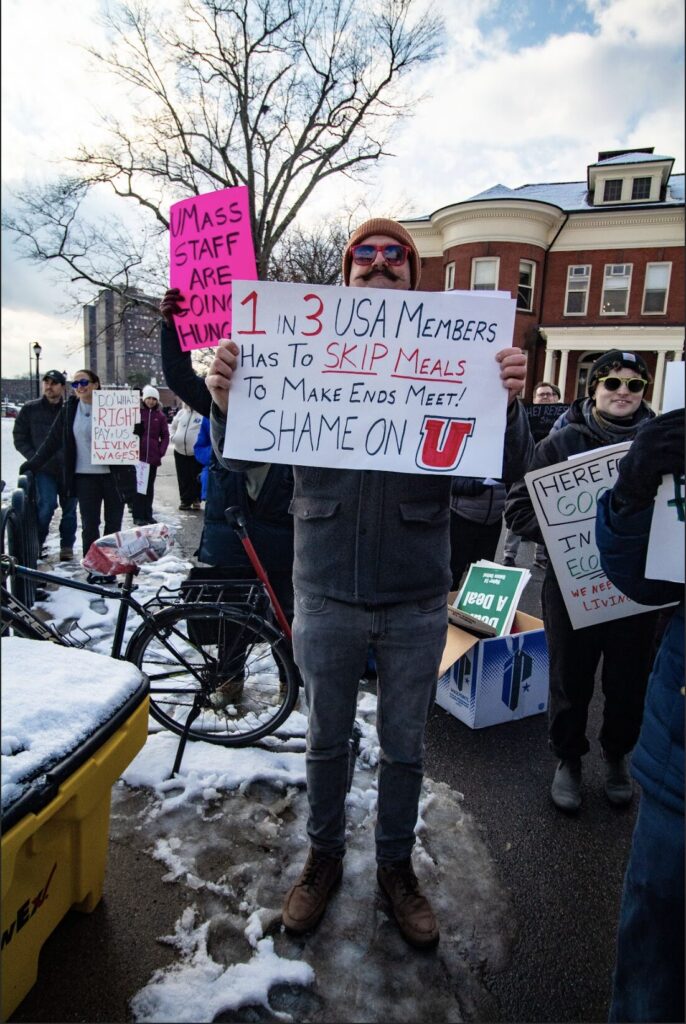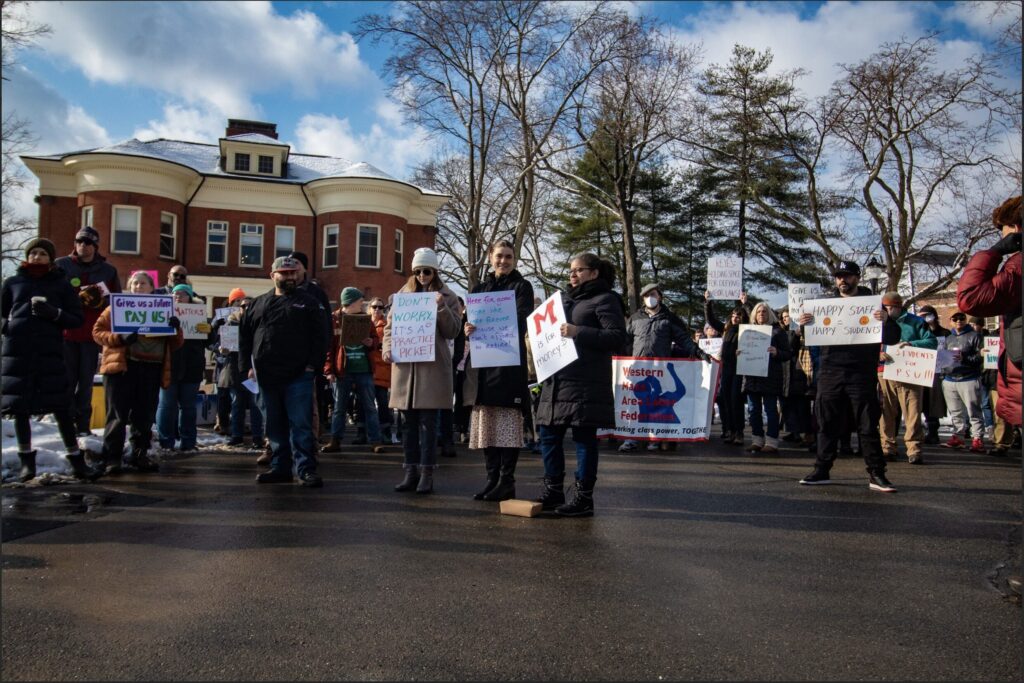The Longer We Stay, the Less We Make. UMass Unions Protest Low Wages

About 250 members of five UMass labor unions including PSU marched to the Whitmore Administration Building on December 5, 2024 to protest low wages on campus. Photo: Alexis Ali
By Alexis Ali and Ari Jewell
An estimated 250 UMass union members gathered on the UMass Amherst campus on December 5 to call attention to the low wages paid to faculty and staff. The Professional Staff Union (PSU), Massachusetts Society of Professors (MSP), the American Federation of State, County & Municipal Employees (AFSCME), the Graduate Employee Organization (GEO), and the University Staff Association (USA) came together to protest low pay.
PSU, like other campus unions, is currently bargaining three-year contracts with the university. PSU’s Unit A contract, covering over 2,400 professional staff at UMass Amherst and Boston, expired on July 1, 2024. Unlike most other unions on campus, PSU members are still subject to an outdated salary system with no mechanism for regular raises. In fact, a common strategy for getting a raise is to leave a position for one with a higher wage elsewhere on campus.
Earlier this week, PSU presented to UMass management a proposal to update the salary system to ensure employees earn living wages (based on the MIT living wage calculator) and receive raises commensurate with their years of service. This proposal presentation was followed by the testimony of several members. Hannah Bernard, who works as Program Manager for Student Success Communications said,

“UMass pays top talent far, far below comparable public and private sector jobs, then wonders why it has a retention issue. UMass offers only one way of making more money – leaving. Wage increases and the implementation of a step system that allows employees to actually envision, and plan for, the kinds of future that higher management enjoys, are the only ways UMass will solve the retention issue it claims to be so worried about.”
Currently, many salaried staff members have second or third jobs in order to support their families in an economy where inflation is rapidly outpacing the rate of pay raises at the university.
“USA did a survey earlier in the year where we asked people if they had dealt with issues related to food insecurity, either having skipped meals or having had to reduce the size of meals because they didn’t have enough money for food,” explained Kyle Chambers, an employee in the registrar’s office and member of the University Staff Association. Chambers noted that one-third of USA members who responded to the survey said yes to this question. “When you have co-workers on your team that are dealing with that, it’s maddening. We are an institution that makes billions of dollars a year and we can’t afford to give our employees some semblance of a living wage? That’s disgusting and it needs to change.”
The Massachusetts Society of Professors (MSP), representing faculty and librarians at UMass Amherst, brought 120 members to bargain with leadership today (12/5) to discuss compensation. MSP member and Professor of Sociology & Labor Studies Eve Weinbaum said,,
“Our top priorities align with the university’s—continuing to recruit and retain the best possible faculty and librarians, and allowing us to do the things that make us great at research. Our proposals included raising the minimum pay to a living wage for new faculty and making our system more equitable by closing the gaps between people based on gender, race, or field so that we can retain the best people and provide the best education to our students.”
Union members staged this protest in front of the Whitmore Administration Building, which houses offices of many upper-level administrators. In coming weeks, the university unions will continue to negotiate with UMass management for fairer wages, full staffing, workplace protections, and other rights and benefits.
“UMass needs to stop acting like a Wall Street bank and invest in the staff and faculty who help our students succeed,” said Andrew Gorry, co-chair of the Professional Staff Union. “This campus is seeing massive surpluses—over $100 million excess cash for two years running—while its employees take on second jobs and struggle to put food on the table. This is what failed leadership looks like.”
Photos and video from the event are available on the PSU’s Instagram: instagram.com/professionalstaffunion/
For more details on what PSU is bargaining for, visit the PSU bargaining headquarters.

